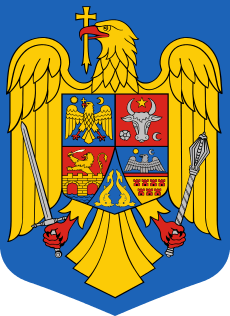Israel–Romania relations are foreign relations between Israel and Romania. Both countries established full diplomatic relations on June 11, 1948. Israel has an embassy in Bucharest.[1] Romania has an embassy in Tel Aviv and 3 honorary consulates (in Haifa, Jerusalem and Tel Aviv).[2] The two countries have signed many bilateral treaties and agreements and both of them are full members of the Union for the Mediterranean and many other international organizations.
Country Comparison
|
 Israel Israel |
 Romania Romania |
| Populations |
7,968,300 |
19,043,767 |
| Area |
20,770/22,072 km² (8,019/8,522 sq mi) |
238,391 km² (92,043 sq mi) |
| Population density |
359/km² (930/sq mi) |
80/km² (207/sq mi) |
| Capital |
Jerusalem (disputed) |
Bucharest |
| Largest city |
Jerusalem (disputed) |
Bucharest |
| Government |
Unitary parliamentary republic |
Unitary semi-presidential republic |
| First Leader |
David Ben-Gurion |
Nicolae Ceaușescu |
| Current Leader |
Benjamin Netaniahu |
Traian Băsescu |
| Official languages |
Hebrew, Arabic |
Romanian |
| Main religions |
80.1% Judaism, 14.6% Islam |
87% Eastern Orthodox, 6.8% Protestant |
| GDP (nominal) |
$243.654 billion ($32,351 per capita) |
$171.401 billion ($8,029 per capita) |
| GDP (PPP) |
$236.994 billion ($31,467 per capita) |
$274.070 billion ($12,838 per capita) |
| Military expenditures |
$15.209 billion (6.5% of GDP) |
$2.164 billion (1.4% of GDP) |
History
During the Cold War, Romania was the only communist country not to break its diplomatic relations with Israel. In 1984, the Romanian minister of tourism visited Israel. The Romanian foreign minister Ioan Totu arrived in January 1988 accompanied by his department director, Mielcioiu. The minister of foreign trade and international cooperation, Ioan Unger came with a Romanian delegation in October 1988. Ceausescu's emissaries were sent for talks with Israeli leaders, though the head of state himself did not pay an official visit, claiming he would only do so when the Arab-Israeli conflict was resolved.[3]
In 2010, Israeli President Shimon Peres visited Romania and met with several Romanian leaders, among them President Traian Basescu, Senate leader Mircea Geoana and Lower House Speaker Roberta Anastase. They discussed cooperation in the areas of defense, technology, education, business and tourism, and signed two agreements.[4]
See also
References
External links
|
|---|
| | Africa | | |
|---|
| | Americas | |
|---|
| | Asia |
|
|---|
| | Europe | |
|---|
| | Disputes |
- Romania–Ukraine maritime delimitation
|
|---|
| | Related topics | |
|---|
| |
|


